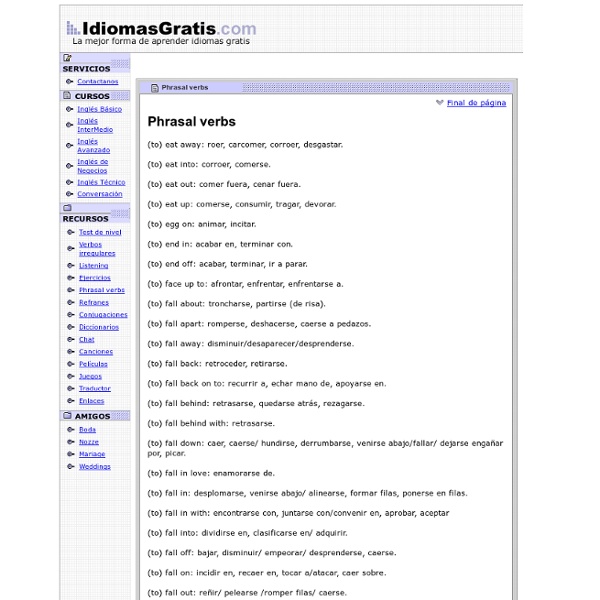Phrasal Verbs con frases explicativas y traducción. Vocabulario inglés. Aprende idiomas gratis
1. Break down When a machine or a vehicle breaks down, it stops working. 2. 3. 4. 5. 6. 7. 8. 9. 10. 11. 12. 13. 14. 15. 16. 17. 18. 19. 20. 21. 22. 23. 24. 25. 26. 27. 28. 29. 30. 31. 32. 33. 34. 35. 36. 37. 38. 39. 40. 41. 42. 43. 44. 45. 46. 47. 48. 49. 50. 51. 52. 53. 54. 55. 56. 57. 58. 59. 60. 61. 62. 63. 64. 65. 66. 67. 68. 69. 70. 71. 72. 73. 74. 75. 76. 77. 78. 79. 80. 81. 82. 83. 84. 85. 86. 87. 88. 89. 90. 91. 92. 93. 94. 95. 96. 97. 98. 99. 100. 101. 102. 103. 104. 105. 106. 107. 108. 109. 110. 111. 112. 113. 114. 115. 116. 117. 118. 119. 120. 121. 122. 123. 124. 125. 126. 127. 128. 129. 130. 131. 132. 133. 134. 135. 136. 137. 138. 139. 140. 141. 142. 143. 144. 145. 146. 147. 148. 149. 150. 151. 152. 153. 154. 155. 156. 157. 158. 159. 160. 161. 162. 163. 164. 165. 166. 167. 168. 169. 170. 171. 172. 173. 174. 175. 176. 177. 178. 179. 180. 181. 182. 183. 184. 185. 186. 187. 188. 189. 190. 191. 192. 193. 194. 195. 196. 197. 198. 199. 200. 201. 202. 203. 204. 205. 206. 207.
Phrasal Verb Dictionary
To look up a phrasal verb, click a letter in the menu. The formats below are used in phrasal verb definitions.separable verbs: (talk * into)inseparable verbs: (run into +)object can be in both positions: (look * up +) 1. A phrasal verb is a verb plus a preposition or adverb which creates a meaning different from the original verb. Example: I ran into my teacher at the movies last night. run + into = meet He ran away when he was 15. run + away = leave home 2. Example: He suddenly showed up. 3. Example: I made up the story. 4. Example: I talked my mother into letting me borrow the car. 5. Example: I ran into an old friend yesterday. 6. Example: I looked the number up in the phone book. 7. Example: I looked the number up in the phone book. Also try our Verb + Preposition Dictionary to look up standard verb + prepostion combinations. Your personal online English school.
Online Dictionary - HyperDictionary.com
Reglas para hablar - 5 reglas para hablar inglés
1. No estudiar gramática Esta regla pudiera parecer extraña para muchos estudiantes de inglés como segundo idioma, pero es una de las reglas más importantes. Si desea aprobar algún examen, entonces estudie gramática. Sin embargo, si desea adquirir fluidez en inglés, entonces debe intentar aprender inglés sin estudiar gramática. Estudiar gramática solamente lo retrasará y lo confundirá. Con frecuencia pregunto a mis amigos hablantes nativos de inglés sobre cuestiones gramaticales, y solamente unos cuantos conocen la respuesta correcta. ¿Desea poder recitar la definición de un verbo causativo, o desea hablar inglés fluidamente? 2. Muchos estudiantes aprenden vocabulario e intentan poner muchas palabras juntas para crear un enunciado apropiado. Si conoce 1000 palabras, puede ser que no sepa decir un enunciado correcto. La sección Bases para hablar inglés es un magnifico ejemplo de cómo hacer numerosos enunciados en una sola frase. No traduzca 3. 4. 5. Resumen
Bee English Dictionary: Free Online Dictionary of English
Learn 35+ Languages for Free in iTunes
I was just browsing iTunes for poignant Morrissey covers when I discovered nearly a thousand free language courses on iTunes. 926 courses to be exact. Holy Moleskine, Batman! The extensive library of courses span over 35 languages, from Arabic to Yiddish. To get the entire list of language learning podcasts, hit the browse button on the lower-right corner of your iTunes window–it’s the icon that looks like an eye. Or you can simply do a search for the language you’re interested in. Here’s a sample list of available languages (with links to iTunes): Don’t forget to check out some of the more unusual podcasts such as: I’ve been teaching myself Brazilian Portuguese with Rosetta Stone, so having access to a free supplemental iTunes podcast is nice. If you liked this post, please share it on del.icio.us. What language have you been itching to learn?
Phrasal Verb Demon. Complete guide to phrasal verbs. Phrasal Verb Dictionary
Home > Phrasal Verb Dictionary: Letter R Rack up [Rack something up].- (losses, sales, points, titles) When you rack something up, it gradually increases in number or ammount. Japanese athletes racked up only two medals in Salt Lake City. Most biotech companies are still racking up losses. You may begin racking up points as soon as your membership is approved. Rake up [Rake something up].- (scandal, the past, old grivances, quarrel, filth, mistake, misdeeds, story) When you rake something up, you remind somebody of unpleasant events in the past: Dig up, dredge up I didn't feel entirely comfortable raking up the past but I agreed to support her whatever she decided. Rattle on.- (insep) When you rattle on, you talk continuouly in a boring way. Rabbit on He kept rattling on about her new car. Rabbit on.- (insep) When you rabbit on, you talk continuouly in a boring way: Rattle on Read on.- (insep) When you read on, you continue reading after having stopped. Call up, phone up We've been ripped off.



